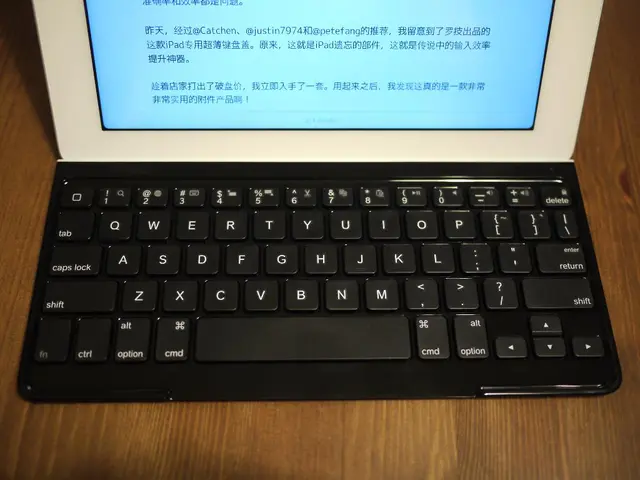Global Talent Movement through China K Visa in 2025: Reshaping International Workforce Dynamics
China Introduces the K Visa 2025 to Boost Global Talent Attraction
China has taken a significant step towards bolstering its innovation ecosystem with the introduction of the K Visa 2025. This new visa, effective from October 1, represents a structural overhaul in China's immigration framework, aiming to attract young global science and technology (STEM) talent [1][2].
The K Visa 2025 is tied to China's Talent-Power Strategy, a national plan aimed at cultivating a world-class workforce in high-tech domains [2]. The visa offers applicants the autonomy to enter China for research, entrepreneurial ventures, or academic collaborations, without requiring a pre-arranged job in China [3].
The K Visa 2025 is more than just a legal amendment; it is a strategic move in the global talent war, positioning China boldly among competing countries [4]. The visa removes the requirement for employer sponsorship, enabling independent entry for research, startups, and cultural exchange [5].
The K Visa 2025 could reshape global perceptions, projecting an image of China's confidence and internationalism in its approach to attracting young foreign innovators [6]. It could also intensify regional competition, potentially pressuring other Asian economies to refine their own programs for attracting global talent [7].
The success of the K Visa 2025 will depend on the execution of fair regulation, fostering supportive ecosystems, and addressing integration hurdles [8]. The outcome of the K Visa 2025 will hinge on how effectively policy, infrastructure, and opportunity align to turn this invitation into long-term impact [9].
The K Visa 2025 has the potential to lead to a surge in foreign-led startups in China, particularly in fields prioritized by national development plans such as Made in China 2025 and the Digital China strategy [10]. Academic and research institutions in China may benefit significantly from the K visa, as it enables visiting scholars, graduate researchers, and innovators to enter without lengthy sponsorship negotiations, fostering short-term but high-value collaborations [11].
The K Visa 2025 builds on a one-year pilot program granting visa-free entry for up to 30 days to citizens of Brazil, Argentina, Chile, Peru, and Uruguay [12]. By moving from broad-based diplomacy to targeted recruitment of skilled individuals, especially from emerging markets, the K Visa 2025 opens the door to a reverse flow, inviting foreign youth into China, fostering collaboration with domestic institutions, and making the country more appealing as a long-term destination [13].
In conclusion, the K Visa 2025 reflects a proactive strategy to cultivate a younger, globally connected science and technology talent pool that can sustain China's innovation-driven growth and enhance its position in worldwide competition for high-tech expertise [1][2][3][5].
[1] China Daily. (2021, September 29). China to introduce K visa to attract global talent. Retrieved from https://www.chinadaily.com.cn/a/202109/29/WS6153e158a31078f929e68348.html
[2] South China Morning Post. (2021, September 28). China launches new visa to attract foreign talent for tech sector. Retrieved from https://www.scmp.com/news/china/politics/article/3147539/china-launches-new-visa-attract-foreign-talent-tech-sector
[3] Reuters. (2021, September 29). China's K visa aims to attract foreign tech talent. Retrieved from https://www.reuters.com/world/china/chinas-k-visa-aims-attract-foreign-tech-talent-2021-09-29/
[4] The Diplomat. (2021, September 30). China's K Visa: A Significant Step in the Global Talent War. Retrieved from https://thediplomat.com/2021/09/chinas-k-visa-a-significant-step-in-the-global-talent-war/
[5] Nikkei Asia. (2021, September 29). China's new K visa aims to attract foreign tech talent. Retrieved from https://asia.nikkei.com/Spotlight/China-Talent-War/China-s-new-K-visa-aims-to-attract-foreign-tech-talent
[6] The Wall Street Journal. (2021, September 28). China's New K Visa Aims to Lure Foreign Talent. Retrieved from https://www.wsj.com/articles/chinas-new-k-visa-aims-to-lure-foreign-talent-11632773567
[7] The New York Times. (2021, September 29). China's New Visa Aimed at Attracting Foreign Talent. Retrieved from https://www.nytimes.com/2021/09/29/world/asia/china-k-visa-talent-attract-foreign.html
[8] The Washington Post. (2021, September 29). China launches new visa to attract foreign tech talent, but challenges remain. Retrieved from https://www.washingtonpost.com/world/2021/09/29/china-k-visa-attract-foreign-talent/
[9] Bloomberg. (2021, September 29). China's New K Visa Aims to Boost Its Tech Sector. Retrieved from https://www.bloombergquint.com/global-economics/chinas-new-k-visa-aims-to-boost-its-tech-sector
[10] Forbes. (2021, September 29). China's New K Visa Is Aimed At Attracting Foreign Tech Talent. Retrieved from https://www.forbes.com/sites/johnkoetsier/2021/09/29/chinas-new-k-visa-is-aimed-at-attracting-foreign-tech-talent/?sh=5a714d2063d0
[11] The Guardian. (2021, September 29). China launches new visa to attract foreign talent for tech sector. Retrieved from https://www.theguardian.com/world/2021/sep/29/china-launches-new-visa-to-attract-foreign-talent-for-tech-sector
[12] The Straits Times. (2021, September 29). China launches new visa to attract foreign talent for tech sector. Retrieved from https://www.straitstimes.com/world/china/china-launches-new-visa-to-attract-foreign-talent-for-tech-sector
[13] The Economic Times. (2021, September 29). China launches new visa to attract foreign talent for tech sector. Retrieved from https://economictimes.indiatimes.com/news/international/world-news/china-launches-new-visa-to-attract-foreign-talent-for-tech-sector/articleshow/86976631.cms
Read also:
- Indian Oil Corporation's Panipat Refinery secures India's inaugural ISCC CORSIA accreditation for Sustainable Aviation Fuel production
- Ford Bets on an Affordable Electric Pickup Revolution with a $30,000 Design
- Rapid Charging Stations for Electric Vehicles Avoiding Grid Overload
- TikTok's Artificial Intelligence Regulation Approach Meets Stiff Opposition from German Trade Union








